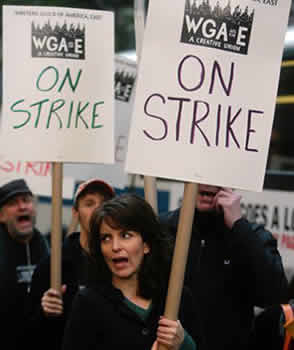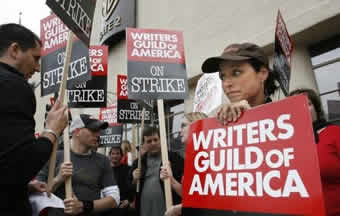No doubt Hollywood writers would love to write themselves out of a bad scene – the current strike – but their foreign counterparts are determined to write themselves into the drama by demonstrating today (Wednesday, Nov. 28) for an international day of solidarity with the Writers Guild.
Sponsored by the International Affiliation of Writers Guilds, which represents over 20,000 screenwriters in unions worldwide, the marches will rally writers demonstrating in Dublin, Paris, Amsterdam, London, Sydney, Auckland, Montreal, and Berlin. And there’ll be a rally at NBC Studios in Burbank, too.
It’s great that the writers overseas are taking the cause of their Yankee brethren to heart. Indeed, it seems the Writers Guild has been effectively using international relations and technology to gather support from international writers guilds in ways that we haven’t seen in the past. By the “past” I refer particularly to that nasty five-month Writers Srike of 1988, which I covered as my very first beat on The Hollywood Reporter. During that seemingly endless quagmire, I remember writing seemingly endless stories on the two clear winners emerging from the war zone: the runaway growth of runaway production– shows were dashing off to Australia and Canada to shoot – and the arrival of non-written reality TV.
This time around, cynics might say that foreign production companies will surely exploit the Hollywood strike by producing local shows to flog to American networks. As a matter of fact, they have said it. Variety ran a story on Tuesday about Euro production house Endemol practically salivating at the thought of all those vacant time slots on U.S. network TV being filled up by foreign-made shows like Endemol’s “Deal or No Deal” (kind of like the starving tummies of little Olivers being served up more bad gruel from the orphanage chef, I’d say.) That kind of scenario is exactly what the writers would love to avoid – and hence their savvy public relations work in helping to orchestrate the solidarity marches that are happening around the world today.
networks. As a matter of fact, they have said it. Variety ran a story on Tuesday about Euro production house Endemol practically salivating at the thought of all those vacant time slots on U.S. network TV being filled up by foreign-made shows like Endemol’s “Deal or No Deal” (kind of like the starving tummies of little Olivers being served up more bad gruel from the orphanage chef, I’d say.) That kind of scenario is exactly what the writers would love to avoid – and hence their savvy public relations work in helping to orchestrate the solidarity marches that are happening around the world today.
“The Writers Guild is gathering such support preemptively because what they want to cut off is the possibility is that the studios would have access to professional quality writers in other countries to develop subterfuge product and break the strike. “
So says Jonathan Handel, an attorney from the law firm of Troy and Gould who himself has been known to be an occasional, but realistic, cynic. As a digital rights expert and former associate counsel for the Writers Guild, he seems to have found in the current strike a perfect niche for mating his knowledge base to the base-camp issues affecting writers and producers. He also happens to be an old chum from my Harvard years whom I can always count on in a pinch to wax savvy during a writing deadline. (Yes, some of us writers are still pushing pens and punching keyboards while our better-paid brethren push their placards and protest. To me it’s all the same march for the same mission – fair compensation for writers’ underpaid fare.)
“Will the American strike help the foreign guilds?” Jonathan asks rhetorically. “The answer is yes. The internet has dramatically increased the flow of information in all directions in this business as it has in others. When you see the Italians looking at the American strike and saying — gee, a strike! That sounds like a great idea to us! What you see there is one guild learning from another.”
Call it pattern learning – which is similar to the idea of pattern bargaining, where the results of one guild’s negotiations sets a pattern that is followed in the other guilds’ talks. (Jonathan also covers this issue in his thorough and informative blog reports on the strike). It’s a global business and a global technology, after all.
Not to denigrate the pride and passion of the foreign marchers, but my own feeling is that solidarity marches are primarily cosmetic. They’ll provide news of the strike on a slow news day, but at least that news will be favorable to the Writers Guild in their public relations battle.
That’s a battle which the writers are waging far more effectively than the studios, and which their fellow unionists overseas will doubtless “pattern learn” if they too go on strike. (Check out the writers’ videos on the WGA’s YouTube page )
“YouTube and its competitor sites are as popular overseas as they are here, and in some countries sharing video on cell phones is far more prevalent than in the U.S.,” Jonathan reminds me, knowing of my keen aversion to text and video messaging. “So I think you’ll see those same tactics and techniques adopted by forein guilds if they do go on strike.”
 In the meantime, foreign rallies or no foreign rallies, the strike and its marchers march on. But maybe not for long. If a few “insiders” blogging on The Huffington Post is any indication, the perameters of a possible deal may already be in the works.
In the meantime, foreign rallies or no foreign rallies, the strike and its marchers march on. But maybe not for long. If a few “insiders” blogging on The Huffington Post is any indication, the perameters of a possible deal may already be in the works.
“Oh certainly, this strike will resolve itself before Christmas,” says Jonathan the sometime cynic, in a guardedly optimistic moment. Either the strike will end, he predicts, or the producers will drop talks with the writers, begin negotiations with the directors and do a deal that would likely be more favorable to the studios than the writers would ever want.
“And then the writers and the actors would be under enormous pressure to take the deal that the directors do with the studios,” he concludes.
Oh dear. That would mean more pattern bargaining and pattern learning and pattern headaches leading to pattern baldness. My cynical sixth sense tells me that if things get really hairy (providing any hair on their heads is left), writers on this side of the Pond may be forced to spend Christmas watching those foreign reality shows from all those Scrooge-like European production houses just waiting to cry bah-humbug to their own misfortunes. What kind of holiday would that be?
I’d rather watch patterns – test patterns – on the tube.

